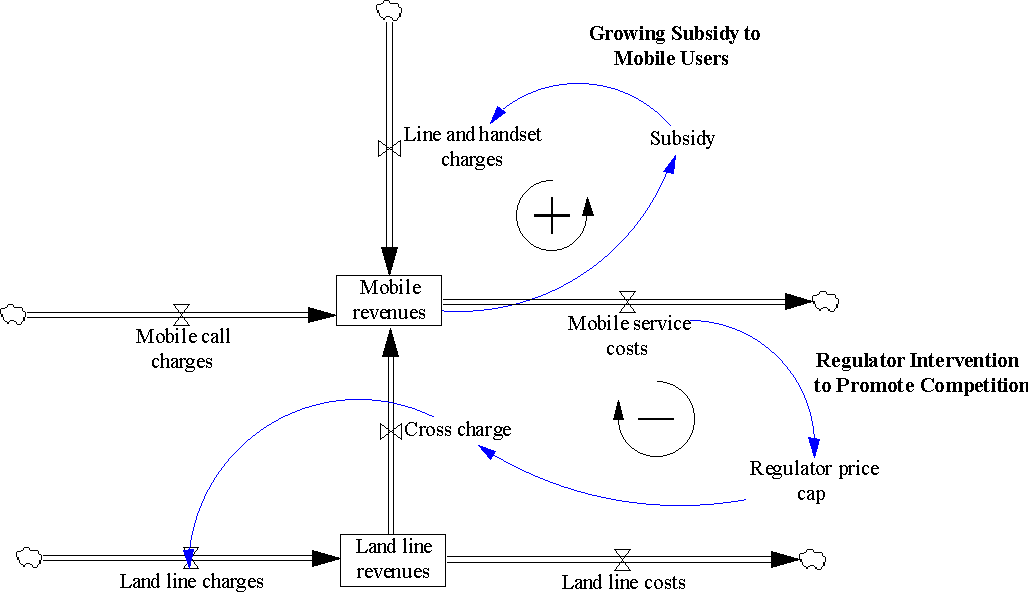
Case
|
Mobile Phone Charges |
Foundations of Business |
Mobile telephone operators, led by Vodafone, insist that this will not result in lower charges for mobile phone customers, since they will simply pass the costs on to their customers in different ways – through higher billing or reduced handset subsidies. Vodafone announces that it will seek a judicial review of Oftel’s action, and warns that mobile costs may have to rise.
These charges are currently running at over 20p per minute, although telecom analysts argue that the true cost of the service should be no more than 10p per minute.
Telecom charging has generally been based on the principle that the caller should pay. Since the underlying cost of making a call to a mobile phone is greater than the underlying cost of making a call to a fixed phone, we may reasonably expect to pay more for making calls to a mobile phone.
However, if the charges are unreasonably high, then this means callers to mobile phones are not just paying for the calls, but are helping to subsidize other aspects of mobile phone ownership and operation.
When this merely involves exchange of costs between mobile networks, the first-order effects may simply cancel out. However, when it involves exchange of costs between mobile networks and fixed networks, then the effects are asymmetrical.
It has been estimated that the controls imposed by Oftel will reduce the annual amount paid by BT to Vodafone by around ½ billion pounds. No wonder Vodafone is so loudly upset, and BT so quietly pleased.

It will be cheaper to phone the plumber on his mobile. The plumber will pay a larger proportion of the cost of the call, through higher rental and handset charges. But the plumber will have to charge more for plumbing. So it all balances out, more or less – at least for the average household.
At the margins, of course, there will be some noticeable differences. People who are at the bottom of the socio-economic ladder are unlikely to have a full range of telephone devices and services, and may therefore experience a net positive or negative effect.
As the subsidy from fixed line subscribers to mobile phone customers is removed, the latter are no longer as well protected from the economic and social costs of mobile phone operation. This may result in an increase in the elasticity of demand. This in turn increases the competitiveness in the industry, as mobile operators are forced to pay more attention to the value-for-money they offer their customers. Ultimately, this may have a downward effect on prices.
Thus the action of the regulator shifts costs from areas that are not subject to competitive pressure into areas that are subject to competitive pressure.
However, the intervention is intended to have the indirect effect of increasing the elasticity of demand in certain areas of telephone operation. This indirectly promotes competition through positive feedback. This would be a Level 6 intervention. Furthermore, it improves the alignment between the interests of the telephone companies and the furtherance of competition. This would be a Level 4 intervention.
While the regulator doesn’t have the power to intervene directly at these levels, the price controls are intended to have an indirect effect at these levels. Introducing these price controls can therefore be regarded as a strategic intervention.
We should note here that such strategic interventions typically involve some risk as well as reward. It is possible that the regulator is strategically outmanoeuvred by some of the players, or frustrated by events. A strategic intervention may well fail to achieve the intended results, or produce unwanted side-effects. However, the possibility of failure doesn’t make the intervention any less strategic.
To some extent, the embarrassment factor is irrelevant to the main strategic intervention.
However, the regulator is constantly under pressure from manipulation and spin by large players. If a large player is publicly embarrassed about something, this may have the effect of weakening its ability to manipulate public opinion in its favour. Occasional embarrassment, and the threat of more frequent embarrassment, may serve to keep large players compliant.
And in some quarters, the effectiveness of the regulator is judged by the squeals and groans elicited from interested parties. A regulator who never publicly upsets or embarrasses anyone is liable to be regarded (possibly unjustly) as weak and ineffectual.
Conversely, a large player who succeeds in embarrassing the regulator, or creating a public belief in the regulator’s incompetence, may hope to win some respite from regulatory attention. However, this is a risky strategy – it may merely provoke the regulator into more heavy-handed intervention.
Squealing at the actions of the regulator is therefore a political tactic, which may sometimes have the effect of convincing the regulator and his political masters that he has done enough for the present. This assumes a negative feedback loop – that the regulators will stop when the squeals are loud enough.
However, the psychology of the bully operates on positive feedback loops – the bully gets gratification from the squeals, and therefore focuses his attention on targets that will squeal the most. If the regulator is under extreme pressure from his political masters to achieve visible results in the short-term, then he will focus his attention on targets that can be expected to squeal most loudly.
| What system is Vodafone looking at? What system is the regulator looking at? What system might a customer look at? What are the implications of looking at different systems? | |
| If the regulator is to promote competition while also being fair, what information does he need about cross-charging? Are there any accounting issues in arriving at that information? Are then any ethical issues in how accounting is performed in such a situation? | |
| What are the governance issues in trying to outwit the regulator? Does a board have a duty to its shareholders and customers to export cost where this is possible? Is this a plausible competitive strategy? |
Places to
Intervene in a System
Donella H. Meadows (Whole Earth Review, Winter 97)
![]()
 |
 |
| [top] |
Copyright © 2003 Veryard Projects Ltd & Antelope Projects Ltd http://www.veryard.com/orgmgt/casemobilecharge.htm |